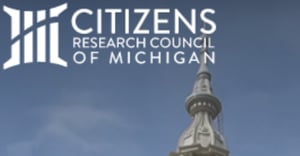
Chris Holman welcomes back Eric Lupher, President of the Citizens Research Council, Livonia, with 4 branches across Michigan.
Watch Eric and Chris discuss the new Citizens Research Council report that analyzes Detroit’s economic development efforts in the YouTube video shared below:
Chris had several things he wanted to find out from Eric. Their primary topic revolved around: New Citizens Research Council Report Analyzes Detroit’s Economic Development Efforts
Eric, welcome back, we haven't spoken since the last Mackinac Policy Conference, please remind the Michigan business community about the New Citizens Research Council?
NCR recently released the first in a two-part series of reports assessing and analyzing the City of Detroit’s economic condition, tell us about it?
So, how much has changed for Detroit in 10 years?
What are the biggest substantial socioeconomic problems for Detroit to overcome?
What's the status of Detroit's population trends as of 2024?
Where can folks go to get this report and when is part 2 coming out?
A release was also shared at the time of the announcement:
New Citizens Research Council Report Analyzes Detroit’s Economic Development Efforts
LIVONIA, Mich., February 2024 – The Citizens Research Council of Michigan released the first in a two-part series of reports assessing and analyzing the City of Detroit’s economic condition, economic development policies, opportunities for reform and alternative approaches to reliance on tax incentives. The reports were developed at the request of the Detroit City Council’s Legislative Policy Division and designed to help inform the debate over the city’s economic development policy. Click here for the full report: An Assessment of Detroit’s Economic Condition and a Critique of its Economic Development Efforts.
Ten years after the City of Detroit declared bankruptcy, Detroit’s economy has improved substantially. That improvement has not changed the economics of business attraction caused by the city’s significant socioeconomic problems and racial disparities that, when combined with high property tax rates, make the city more expensive and lessen the expected rates of return.
Detroit has substantial socioeconomic problems to overcome, as evidenced by the report’s income, poverty, and educational data, making it even more difficult for the city to compete, even with nearby metropolitan areas. According to the report, to overcome these socioeconomic problems, city economic development policy relies on tax incentives to make private investment in Detroit more attractive.
Like the rest of Michigan, Detroit’s population has been steadily declining, which has played a significant role in its weakened economic base. The city’s population peaked in 1950 at 1.8 million and has fallen each decade since, falling to less than an estimated 637,000 in 2022, a 65.4 percent decline. That massive shrinking means fewer people, workers, and business patrons.
“These assessments of Detroit’s economic development efforts will help local elected officials and Detroit’s residents as they discuss, debate, and decide which policy path the city should take,” said Eric Lupher, Research Council president. “It is up to elected officials and citizens to decide what to do with this information.”
In a Nutshell
Detroit’s economy has improved substantially since it filed for bankruptcy a decade ago, yet the city still has serious socioeconomic problems that, when combined with high property tax rates, make it hard to attract and retain businesses.
The property tax rate is one of the handful of costs to do business that the city controls, and to reduce that cost and subsidize what may otherwise be unprofitable investments the city offers tax business attraction incentives—tax abatement and improvements funded through tax increment financing.
After nearly 50 years of granting tax abatements and using tax increment financing to provide improvements in the downtown areas, it could be hoped that conditions in the city would have improved sufficiently so that their use would no longer be necessary.
A cursory analysis of the cost of locating in the city and the revenues businesses can expect to yield reveals that a gap continues to exist stacking the deck against the city for business attractions. Detroit can ill afford to cease the use of tax abatements until the gap between costs developers face and return on investment is closed.
The city has multiple reasons to end the Downtown Development Authority and resume distribution of the collected property tax revenue to the taxing jurisdiction. All of those reasons are negated by the fact that the DDA anticipates needing more than $571 million to finance bonds pledged against tax capture. This suggests that the DDA could not cease operations until at least 2053 at the earliest.
The next report will seek to answer what tax incentives are awarded by the city, whether tax incentives are effective, whether tax incentives are cost-effective, and why the city uses tax incentives. Importantly, it will ask if local elected officials and citizens should consider whether city economic development policy is improperly focused on attracting individual businesses.
Founded in 1916, the Citizens Research Council of Michigan works to improve government in Michigan. The organization provides factual, unbiased, independent information concerning significant issues of state and local government organization, policy, and finance. By delivery of this information to policymakers and citizens, the Research Council aims to ensure sound and rational public policy formation in Michigan. For more information, visit www.crcmich.org
###
» Visit MBN website: www.michiganbusinessnetwork.com/
» Subscribe to MBN’s YouTube: www.youtube.com/channel/UCqNX…
» Like MBN: www.facebook.com/mibiznetwork
» Follow MBN: twitter.com/MIBizNetwork/
» MBN Instagram: www.instagram.com/mibiznetwork/














